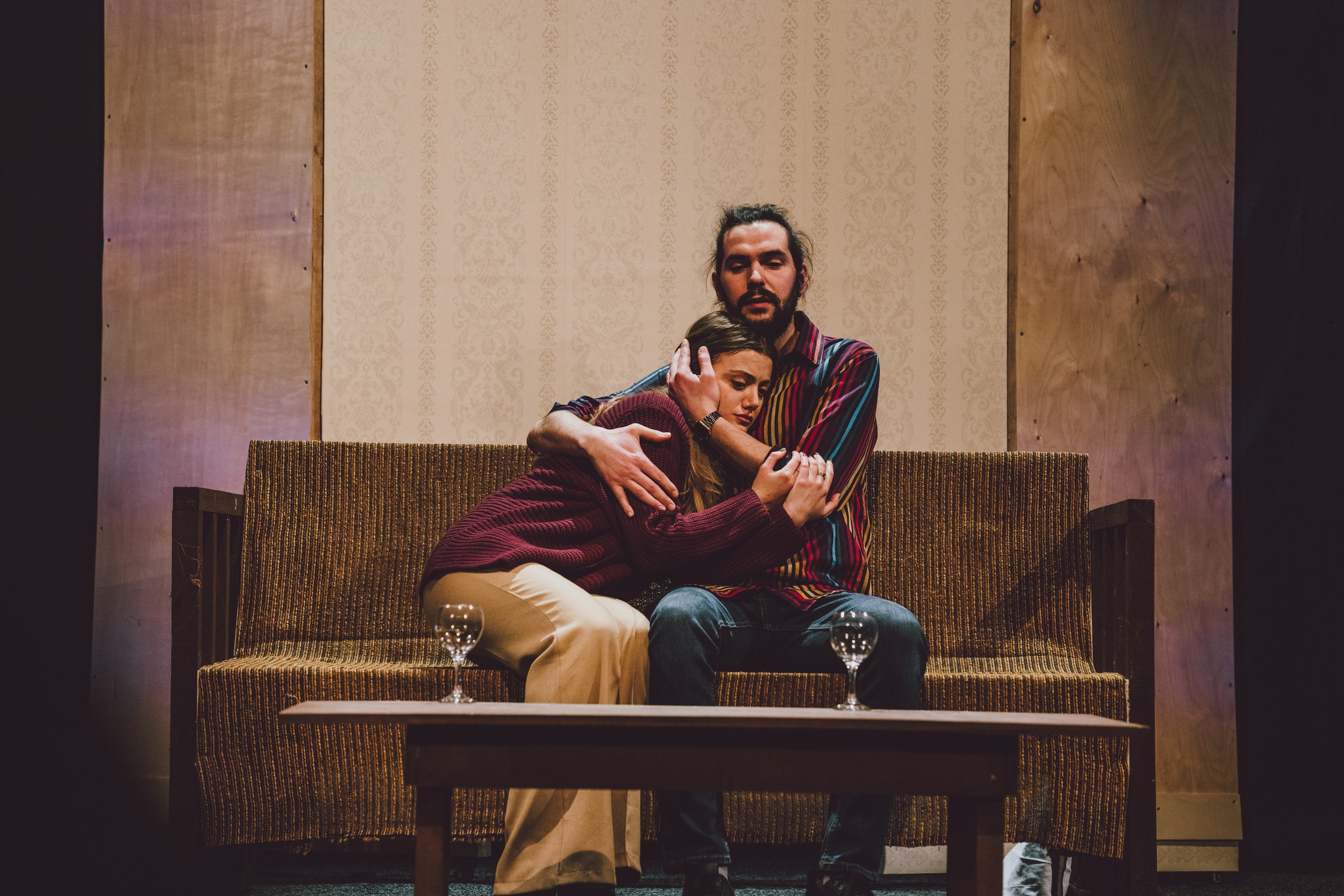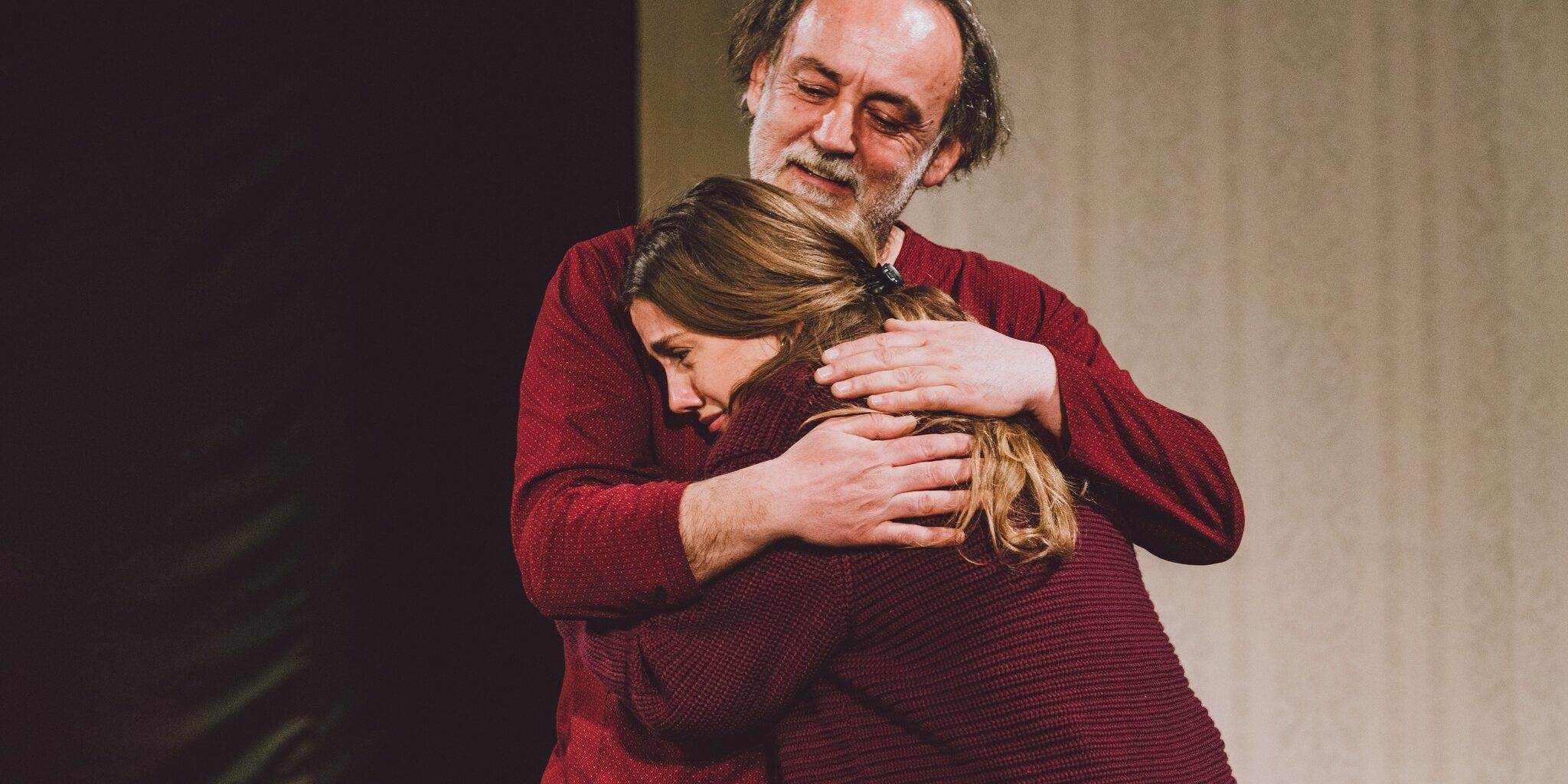Teatri Oda, Prishtina, premiere 6th March 2023
Arbri, the new play by Lirak Çelaj, opens in a scholarly living room. There are books, paintings, an old-fashioned commode, a cozy couch and dinner table. And among all this, Arbër, a gray-haired gentleman in a brown robe de chambre. He is sweet and charming, despite being alarmed state about the terrors of modern technology. “Whatever happened to my old TV? That thing was so easy to use,” he says. This sentence is repeated throughout the play. It is not the only thing that will be repeated.
In the title role, Shkumbin Istrefi gives a masterful performance. He captures the protagonist’s physicality, his broken tone and hunched shoulders, while alternating smoothly between confusion and clarity, as the reality around him seems to be cracking and remaking itself.
The old man at least has a loving daughter who cares and worries about her father. Though we soon learn of her own inner turmoil, as she is torn between wanting to live her own life and having to care for a father with advanced dementia. She brings home kind nurses, only for him to kicks them all out on suspicions of theft, obliging her to sacrifice her own time and relationships for him.
Played with delicacy but firmness by Qëndresa Jashari, the daughter’s character is central to the story; she is her father’s last recourse and his final link with reality. Despite her devotion, the daughter is constantly reminded by her father that she will never be as good as her late sister, to which she can only respond with a silent sigh.
The play is based on the 2020 film The Father, which featured a heart-wrenching performance by the great Anthony Hopkins and was adapted by French playwright Florian Zeller from his own award-laden play Le Père. However, Çelaj puts his own twist on the material.
Arbër is literally and metaphorically stuck in time and space, an impossible state that goes beyond his individual experience. His dementia is populated by broken memories, which are evocative of his own past and the history of Albanians. As a defence mechanism, his memory has chosen one particularly happy time, when his favourite daughter would paint and sing for him – his other daughter, the one who fought and died in the war. Arbër’s brain has erased the memory of her, and he keeps asking his living daughter about her sister.
It is only his happy memories that keep him from going insane. But these harsher memories gradually creep in, as major decisions must be made: about his apartment, about his daughter leaving and him moving into a senior home. It’s a grim picture of a loss of self and a bleak reflection of a fractured life, in which no one is able to pick up all the pieces.
Some of the most jarring scenes show the son-in-law (and later a male nurse) bullying Arbër and slapping him. Labinot Raci shows incredible range, his performance shifting from being a loving partner to Arbër’s daughter and a violent bully to his father-in-law. It’s soul-crushing to see the old man crumbling in tears, barely able to whimper “Please don’t!” In his agony, he forgets who he is.
Physical violence towards seniors is a serious societal problem, with unsettling clips recently circulating on social media and calls for action going largely ignored. Beyond that, it is symbolic of the Albanian societal trauma inflicted by centuries of foreign rule. Well into the 21st century, the struggle for self-identity remains. Yes, there is now freedom, but it’s a gift that came without instructions. The ancient Greek maxim ‘know thyself’ comes to mind, identity as a puzzle yet to be solved.

Arbri at Teatri Oda
Throughout the production the roles are reversed from one scene to the next, with the characters often saying contradictory things. It gradually becomes clear that this is an intended effect to emphasize the magnitude of Arbër’s delirium. Historical nuances are added when he insists on speaking Albanian but can’t help dropping phrases in Serbian and Turkish into his conversation during his worst moments. “What are we… Europeans, Albanians, Kosovars, Serbs, Turks…?” he moans at one point, while grabbing at his messy grey hair in a detached way.
Though told from Arbër’s point of view, the play explores wider societal confusion and collective amnesia as an instinctive defence mechanism in times of despair. The old man in search of his lost self is reminiscent of the predicament of every society in search of identity.
Grappling with financial difficulties, his daughter seeks institutional support, only to endure an outlandish response from a crass agent, played with a candid quality by Blend Sadiku. “Hiring mercenaries would have been cheaper than having to pay for martyrs” he tells her, while casually scrolling through his phone.
The initially homey scenography gradually fades into something starker and by the end it resembles a hospice environment. The brown and burgundy tones are replaced by white and gray. It’s chilling to see Arbër lost in this clinical settings, with no one telling him why or how he is there. “Why does everyone keep changing things without telling anyone?!” he says over and over, as the walls and furniture change from one scene to the next.
The soundtrack is an occasional series of clicks and beeps, reminiscent of the dismal gallop of time which Arbër, now in a care facility, is only half aware of. In occasional instances of lucidity, he is perceptive of the patronizing attitude of his caretaker. “It’s medication time” the nurse croons every day. There is a final glimmer of hope toward the end, when the nurse reminds him that his daughter will come visit on the weekend.
The mere choice of name for the main character is indicative of the deeper historical implications of the play. The ‘Arbër’ were an Illyrian tribe dating back to the 6th century BCE, and the name itself is very common in Albanian-inhabited lands across the Balkan peninsula. Likewise, the play premiered as Kosovo marked 15 years of independence as well as commemorating one of the bloodiest massacres of the war, the Serb military attack in March 1998 that wiped out 55 members of the same family. The Jashari name has since become a symbol of freedom and sacrifice. This play, despite its gentleness, provided a reminder of the deep wounds that linger among those who remember that time.
What history leaves us with is not easy. Not-so-distant memories and haunting trauma, coupled with the new challenges of state-building, make it difficult to discern what is true and what is not. The confusion of Arbër is not unique to him, rather a social phenomenon. Art provides a way of coping and this play is a step toward remedy.
Credits:
Text/director: Lirak Çelaj
Cast: Shkumbin Istrefi, Qëndresa Jashari, Labinot Raci, Daniela Markaj, Blend Sadiku
Stage: Burim Arifi
Lighting: Yann Perregaux Dielf, Bujar Bekteshi
Further reading: review of Pas’humbj (Afterloss) at Teatri Oda
Bora Shpuza is a literary translator and freelance art reviewer based in Prishtina,








